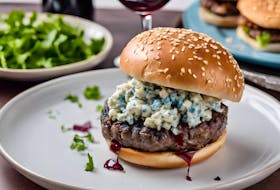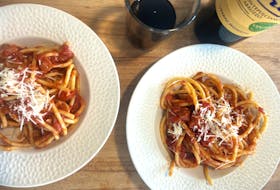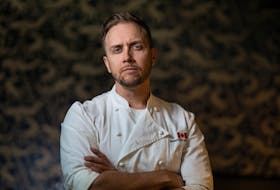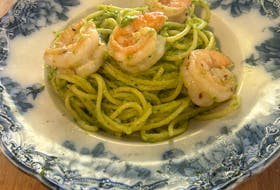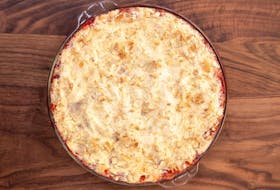Our cookbook of the week is Falastin by chef Sami Tamimi and writer Tara Wigley. To try a recipe from the book, check out: Ful medames , baby gem lettuce with charred eggplant yogurt, smacked cucumber and shatta , and kubez el tahineh (sweet tahini rolls).
At their best, cookbooks inspire a deeper understanding. More than a mere set of instructions, they offer a window to another world — as wide as a region or as narrow as an individual’s kitchen. When cooking from them, you can tap into other places and ways of life in a palpable way. The unfamiliar becomes less so as you apply different methods, flavours or customs.
In Falastin (Appetite by Random House, 2020) — a chronicle of Palestine’s people and foodways — Jerusalem-born, London-based chef and restaurateur Sami Tamimi, and writer Tara Wigley invite just this type of transformation. “Cookbooks are not just recipes. Cookbooks are also an experience — they take you on a journey somewhere,” says Tamimi, who co-wrote two others — Ottolenghi (2008) and Jerusalem (2012) — with business partner Yotam Ottolenghi.
The authors document a vibrant food culture through portraits of people living in Palestine today interspersed with recipes Tamimi grew up eating, and his creative interpretations that have become an Ottolenghi hallmark. Linked to identity and history with a deep connection to seasonality and the land, Palestinian food has a profound sense of place. In sharing the stories of seed savers, olive tree custodians, ‘the yogurt-making ladies of Bethlehem,’ refugee camp cooks and Gazan fishers, Tamimi and Wigley invite readers to interrogate their own preconceptions: to ask questions, to listen and to visit when opportunities to travel open up once again.
“It was Sami’s story in big part because it’s his land and home,” says Wigley, who has been a member of the “Ottolenghi family” for a decade. “(But we also set out to) tell stories about great enterprise and deliciousness going on around food. We wanted to go away from absolutes and share stories just like you share food around a table.”
Tamimi and Wigley took several trips to Palestine while writing Falastin (there’s no “p” in Arabic) — both together and apart. Epic meals were a given: “You don’t leave a Palestinian house hungry, that’s for sure,” says Tamimi. Essays arose from experiences such as making shish barak (lamb dumplings) with Islam Abu Aouda, one of roughly 3,000 refugees living in Aida camp in Bethlehem; and sharing a plate of stuffed vine leaves with Salah Abu-Ali (a.k.a. “the guardian of the olive tree”), who watches over one of the oldest olive trees in Palestine lest it be bulldozed to make way for a continuation of the separation wall.
“The whole purpose of doing this book is to bring a bit of exposure to what’s happening there, firstly. But also exciting food and the more positive things as well. We talk about the ingredients that they use, the connection to the land, the connection to seasonality,” says Tamimi. “We want people to think of Gaza as a place (where) they use quite a lot of green chili and dill and seafood. These places in Palestine are all special in their own way. And we are, in the West, bombarded by all these negative (images) of Palestinians and Palestine.”
Seasons are celebrated to the utmost, adds Tamimi. Tart green almonds — eaten ice-cold with a pinch of salt, shell and all — and green chickpeas, grilled with a squeeze of lemon, are harbingers of spring. “Whenever something comes into season, everybody gets really excited and cooks it — and they also want to preserve some of it for the rest of the year,” he says.
“And that’s also really tied up within hospitality, because it means there’s always enough food to feed about 50 people,” adds Wigley. “So whoever turns up, you just open the jar off the shelf or the freezer and then all that preparation pays off because there’s endless makdous — stuffed aubergines — or fatayer in the freezer ready to go in the oven. So it makes for a very hospitable environment.”
Since Tamimi and Ottolenghi wrote Jerusalem — an amalgam of their experiences growing up on opposite sides of the ancient city — the conversation around Palestinian food culture in the West has grown. Chefs and cookbook authors including Joudie Kalla ( Palestine on a Plate , Baladi ), Reem Kassis ( The Palestinian Table ) and Yasmin Khan ( Zaitoun ) have documented culinary practices while addressing the realities of life in the region, and the resilience of its inhabitants.
With Falastin , Tamimi and Wigley add to this body of work and emphasize the importance of continuing to tell Palestinian stories. Classic dishes such as musakhan and maqluba are represented alongside Tamimi’s creations that take ingredients from the Palestinian pantry and show them in a new light. “A lot of (traditional) Palestinian dishes have already been featured in wonderful books on the market now, and in the past as well, and I’m sure in the future,” says Tamimi. “The essence of ( Falastin ) is Palestinian. We want people to cook and fall in love, and cook it again.”
Copyright Postmedia Network Inc., 2020

